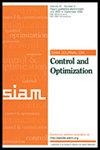构成李雅普诺夫直接法的延伸
IF 2.4
2区 数学
Q2 AUTOMATION & CONTROL SYSTEMS
引用次数: 0
摘要
SIAM 控制与优化期刊》第 62 卷第 4 期第 2346-2366 页,2024 年 8 月。 摘要本文研究了非线性自治系统稳定性、渐近稳定性和全局渐近稳定性的新充分条件,特别是在候选 Lyapunov 函数的一阶导数在其域上可能有正值和负值的情况下。这种方法的主要贡献在于引入了一个新的辅助函数,放宽了稳定性条件,允许候选 Lyapunov 函数的一阶导数小于或等于一个非负函数。在我们的第一个定理中,建议的辅助函数应该是可积分的。同时,我们的第一个推论提出了一种技术,通过建立与微分不等式相关的特定条件来简化任务。在候选 Lyapunov 函数选择不佳或寻找 Lyapunov 函数并不简单的情况下,所提结果中的这种较弱条件能够建立稳定特性。此外,我们还证明了自治系统的原始 Lyapunov 方法是我们第一个定理的特例。此外,我们还证明了之前研究中的假设,如 Matrosov 定理或关于 Lyapunov 函数高阶导数的结果,都能保证我们的辅助函数的存在。最后,我们提供了构建这些辅助函数的定理,并举例说明了这种方法的有效性。这项工作将有助于非线性自主系统稳定性分析技术的发展。本文章由计算机程序翻译,如有差异,请以英文原文为准。
Constituting an Extension of Lyapunov’s Direct Method
SIAM Journal on Control and Optimization, Volume 62, Issue 4, Page 2346-2366, August 2024.
Abstract. This paper investigates new sufficient conditions for the stability, asymptotic stability, and global asymptotic stability of nonlinear autonomous systems, specifically in cases where the first derivative of the Lyapunov function candidate may have both positive and negative values on its domain. The main contribution of this approach is the introduction of a new auxiliary function that relaxes the stability conditions, allowing the first derivative of the Lyapunov function candidate to be less than or equal to a nonnegative function. The suggested auxiliary function should be integrable within our first theorem. Meanwhile, our first corollary presents a technique that simplifies the task by establishing specific conditions related to differential inequalities. This weaker condition in the proposed results enables the establishment of stability properties in cases where the Lyapunov function candidate is not well chosen or finding a Lyapunov function is not straightforward. Additionally, it is proven that the original Lyapunov method for autonomous systems is a special case of our first theorem. Furthermore, it is demonstrated that assumptions in previous studies, such as Matrosov’s theorem or results on higher-order derivatives of the Lyapunov function, guarantee the existence of our auxiliary function. Finally, lemmas are provided to construct these auxiliary functions, and examples are presented to demonstrate the effectiveness of this approach. This work will contribute to the development of stability analysis techniques for nonlinear autonomous systems.
Abstract. This paper investigates new sufficient conditions for the stability, asymptotic stability, and global asymptotic stability of nonlinear autonomous systems, specifically in cases where the first derivative of the Lyapunov function candidate may have both positive and negative values on its domain. The main contribution of this approach is the introduction of a new auxiliary function that relaxes the stability conditions, allowing the first derivative of the Lyapunov function candidate to be less than or equal to a nonnegative function. The suggested auxiliary function should be integrable within our first theorem. Meanwhile, our first corollary presents a technique that simplifies the task by establishing specific conditions related to differential inequalities. This weaker condition in the proposed results enables the establishment of stability properties in cases where the Lyapunov function candidate is not well chosen or finding a Lyapunov function is not straightforward. Additionally, it is proven that the original Lyapunov method for autonomous systems is a special case of our first theorem. Furthermore, it is demonstrated that assumptions in previous studies, such as Matrosov’s theorem or results on higher-order derivatives of the Lyapunov function, guarantee the existence of our auxiliary function. Finally, lemmas are provided to construct these auxiliary functions, and examples are presented to demonstrate the effectiveness of this approach. This work will contribute to the development of stability analysis techniques for nonlinear autonomous systems.
求助全文
通过发布文献求助,成功后即可免费获取论文全文。
去求助
来源期刊
CiteScore
4.00
自引率
4.50%
发文量
143
审稿时长
12 months
期刊介绍:
SIAM Journal on Control and Optimization (SICON) publishes original research articles on the mathematics and applications of control theory and certain parts of optimization theory. Papers considered for publication must be significant at both the mathematical level and the level of applications or potential applications. Papers containing mostly routine mathematics or those with no discernible connection to control and systems theory or optimization will not be considered for publication. From time to time, the journal will also publish authoritative surveys of important subject areas in control theory and optimization whose level of maturity permits a clear and unified exposition.
The broad areas mentioned above are intended to encompass a wide range of mathematical techniques and scientific, engineering, economic, and industrial applications. These include stochastic and deterministic methods in control, estimation, and identification of systems; modeling and realization of complex control systems; the numerical analysis and related computational methodology of control processes and allied issues; and the development of mathematical theories and techniques that give new insights into old problems or provide the basis for further progress in control theory and optimization. Within the field of optimization, the journal focuses on the parts that are relevant to dynamic and control systems. Contributions to numerical methodology are also welcome in accordance with these aims, especially as related to large-scale problems and decomposition as well as to fundamental questions of convergence and approximation.

 求助内容:
求助内容: 应助结果提醒方式:
应助结果提醒方式:


